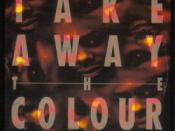Eleanor McHardie PHIL1007
Second Assessment Task
Are colours objective or subjective, or both?
Our visual perception of the world contains colours. Our understanding of colour is related to other facets of what we visually perceive. Our theory of colour can help to understand other theories and concepts. For this reason it is important to come to a conclusion about the objectivity or subjectivity of colour.
The most important question that needs to be asked in regards to this topic is "Are physical objects, independent of perceivers experiences, coloured?"� For example, if there is no one present to look at and perceive a red tomato, is that tomato still red? Or further still, if there is someone present, yet they have never experienced the colour red, is it still correct to describe the tomato as red? Coming to conclusions about these questions will help us come to a conclusion about the subjectivity or objectivity of colour.
One important issue that must be discussed is the conflict between common sense and science in regards to colour theory. Common sense informs us that all physical objets are coloured. Physics informs us that all physical objects are made up of smaller particles such as atoms, and these smaller particles do not physically possess colour. Many physicists, such as Galileo�, take this to mean that an object that one may see as green, does not actually possess any physical property that can be known as green. But this seems inconsistent with our normal, common sense view of colour. It does not seem possible that every object we see as coloured, does not actually possess that colour in any form. This potential paradox can be clearly illustrated as following:
Physical objects are coloured
Physical objects are made up of smaller scientific particles
Smaller scientific particles do...


